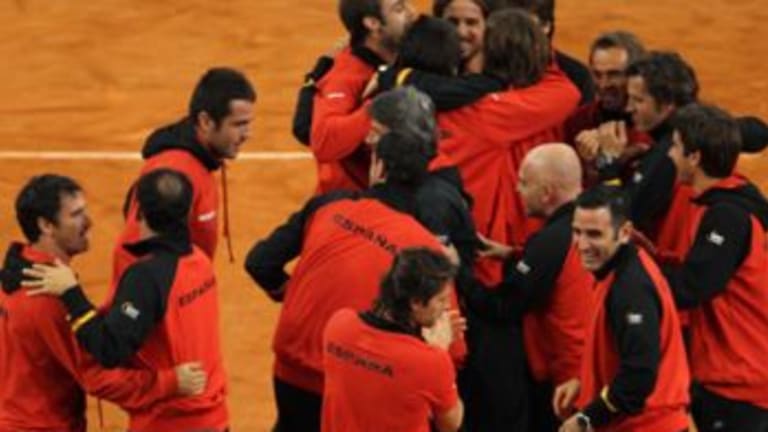Is this the Age of Power in men’s tennis? Of Big 3 dominance? Or is it the Age of Emotion? The tears, the screams, the hugs, the kisses, the leaps, the bounds, the first-pumps, the chest slams: The men’s game is a dramatic place these days. All of which made this past weekend’s tumultuous Davis Cup tie between Spain and Argentina a fitting way to end the latest and some would say greatest season of this tennis epoch. We got plenty of leaps, bounds, and fist-pumps during the matches, and plenty of tears, hugs, and screams of joy afterward. Who could mistake this for a sport of genteel reserve anymore?
What should we make of it all, of Spain’s fifth victory in a decade and Argentina’s continued frustration? Here are five ways to think about 2011’s closing act.
As more proof of Spain’s historic excellence
There may have been better single-season Davis Cup teams than the Spanish have fielded during their five-title, decade-long run. The Aussies of 1973, who used two men, Rod Laver and John Newcombe, to blank the U.S. in the final, will always be tough to top. More recently, Mats Wilander and Stefan Edberg made for a similarly potent one-two punch during their stretch of seven straight finals in the 1980s. Spain’s last three wins have featured just one future Hall of Famer, Rafael Nadal, but the team has made up for it with unprecedented depth. For example: While Feliciano Lopez didn’t offer much of anything in the final, other than a funny stunned look after a Nadal passing shot on Sunday, he won what might have been the most important match of the year for the Spanish by beating Mardy Fish in the quarterfinals, in five sets, on the road.
On clay and at home especially, you have to put the Spanish up there with any Davis Cup team in history.
As proof, if it were needed, of the value of David Ferrer
I said above that recent Spanish teams haven’t had a No. 2 to match an Edberg or a Newcombe, but they haven’t really needed one with Ferrer around. The man has made himself into an uncanny and absolute master of the gritty, five-set, swing-match win. Nadal is the guy you want to close the deal, but he wouldn’t have had as many opportunities if Ferrer wasn’t so good at setting him up.
The game’s resident bricklayer does nothing more, and nothing less, that get the job done. There was no better evidence of that than his win over Juan Martin del Potro on Friday. Ferrer was out-hit and out-played for the better part of four sets, and much of the time he had no answer other than to get the ball back and hope that the big Argentine would miss. Yet there he was in the fifth set, still on his feet, playing the most aggressive tennis he’d played all day, and running away with the match. My favorite moment of the weekend was his extra-long roar of relief when he’d finally sown up the match and, for all intents and purposes, the Cup. Nadal is the star, but Ferrer is the proverbial heart of the Spanish team.
As a mixed set of messages from Juan Martin del Potro
Davis Cup is great in most ways, but it can be as cruel as any competition. Del Potro played nine sets of high-wire attacking tennis and came away with nothing. While he squandered a one-set lead, and a break in the fourth, against Nadal, you can’t really fault him in that match—making any inroads at all against Nadal on clay at home in the clincher was a borderline-heroic effort, coming back from a break down in the fourth was above and beyond expectations, and doing it all without a decent first serve was even more surprising. But you can’t say the same thing about his loss to Ferrer. Del Potro should have won that match. He was the better, stronger, player on the day, but he wasn’t the tougher player. He missed makeable shots when he needed them, and Ferrer didn’t.
What does this say about del Potro going forward? Pretty much what we’ve seen from him in the past. He can play with anyone and hit through anyone, including Nadal on clay. But he has a soft side—and that’s why so many people love him.
